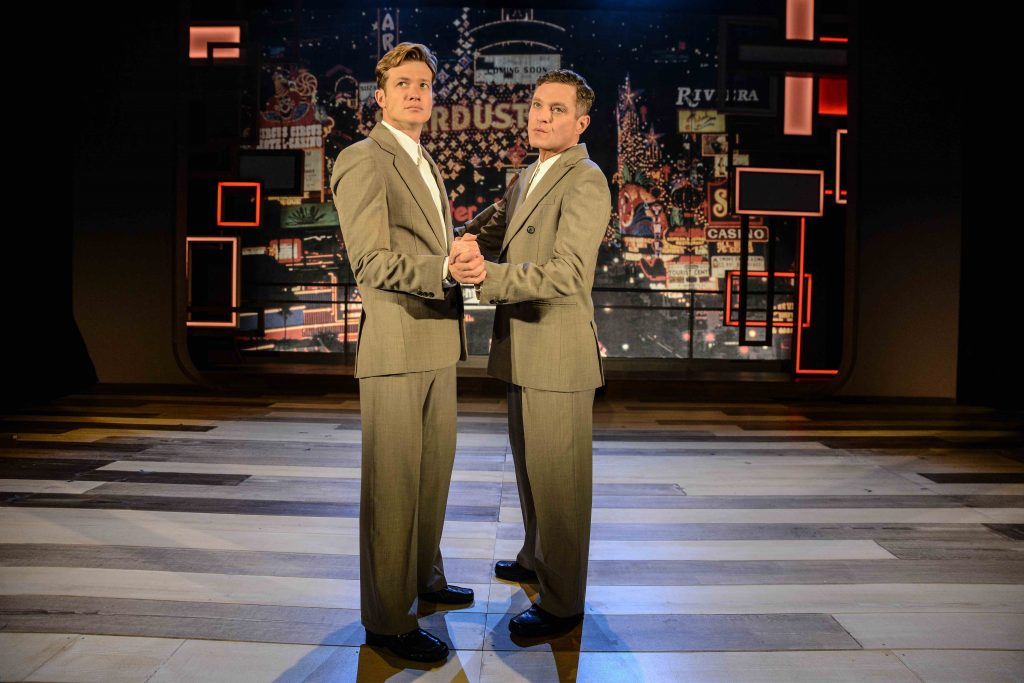Stage-to-screen adaptation of works of drama meant for the theatre is by now a common occurrence; the opposite process has been attempted increasingly often, but the idea of founding a theatre company focussing entirely on it is bold, promising, and not without concerns. One might worry that this kind of adaptation is necessarily a downsizing operation, given the constraints of location and representation involved and the need to break down the action into larger blocks that better fit the pace of stage acting. In this sense, the choice of Rain Man as their first script is particularly bold, as the original film is first and foremost an on-the-road drama, a genre that could be suspected to be particularly unsuitable for stage representation. On top of that, the film can boast some iconic performances by Dustin Hoffman and Tom Cruise, which are familiar to the greatest part of the play’s audience and would certainly pose a challenge to the actors called to match them.
The Classic Screen to Stage Theatre Company’s production of Rain Man confronted these challenges in clever and generally effective ways. The location constraints were addressed and for the greatest part redressed by Morgan Large’s simple but evocative stage design, relying on light to signal in turn the presence of doors, windows, and Vegas’ neon lights, expanding and contracting the space of the action as required. The illusion proved effective, even though the transitions from one scene to the next could often have been smoother, especially as far as the sound design was concerned. The translation of screenplay to script made the equally wise choice of favouring character over action, which was successful in a story that is after all almost entirely about human connections and the personal development of its protagonists.
The performances also measured up convincingly to their Hollywood counterparts. The work done by Mathew Horne as Raymond is particularly remarkable, and his performance demonstrates the in-depth research behind it. It is endearing, convincing, and often genuinely funny, and Horne gives the character his personal spin, starting from the text rather than trying to replicate Hoffman’s famous delivery. This creates a different take on a character that is very much the centre of plot and action, which is both respectful and engaging. On the other hand, Edward Speelers as Charlie appears in some moments to be somewhat too tied to the model of his cinematic counterpart, although this does not compromise the effectiveness of his delivery – which is nevertheless more convincing when he brings his original input into it. The supporting cast also delivers a strong set of performances, keeping up with what is necessarily a rather fast-paced work, only slowing down for a truly touching ending. If the American accents put on by the cast are sometimes slightly wobbly, this barely registers once in the quick of the play, which remains consistently engaging throughout and makes its audience genuinely care for its characters and their growing bond with each other.
The choice of Rain Man for this production is perhaps even more significant as the British theatre scene is beginning to engage more deeply with the issues of disability, its access to the stage and its representation on stage. In this sense the play inserts itself in a wider discourse with a meaningful, interesting contribution. As an experiment of adaptation from screen to stage it is certainly successful, riding on the strength of a script that is heavy on characterisation and better suited for the theatre that one might thing at first glance, and of some very strong performances. As a sympathetic representation of autism it is perhaps at times, like its screen equivalent, somewhat too idealistic, but still it delivers an attempt at understanding that is extremely valuable these days – more so in a stage context that has so far kept disabled and non-neurotypical characters or performers very much in the shadows.
It is an effective work, with imperfections that are balanced by the cast and creatives’ commitment to the story they are telling, which proves both funny and moving and demonstrates the potential of screen-to-stage adaptation.
New Theatre, Cardiff, Until September 15
Evenings 7.30pm
Thursday & Saturday Matinees 2.30pm

